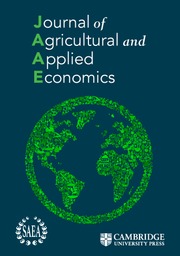Article contents
Why Economists Should Talk to Scientists and What They Should Ask: Discussion
Published online by Cambridge University Press: 28 April 2015
Extract
Although interest in cross-disciplinary research is not new, expressions of the importance of collaboration are increasing. A focus on agricultural sustainability issues, which explicitly recognizes the links among agricultural production activities, the environment, and communities, is an example of this interest. Among agricultural economists, a 1996 Council on Food, Agriculture, and Resource Economics (C-FARE) survey regarding professional priorities indicated that the profession overwhelmingly (92%) believes there is a need for more cross-disciplinary collaboration. This view is common across all sciences (physical and social), and not limited to the agricultural sciences.
- Type
- Invited Paper Sessions
- Information
- Copyright
- Copyright © Southern Agricultural Economics Association 1997
References
- 1
- Cited by


